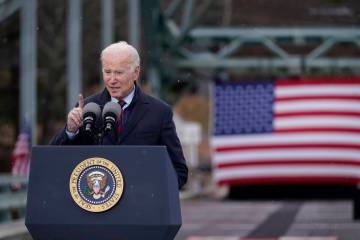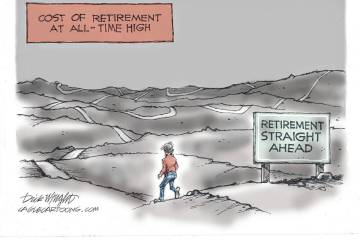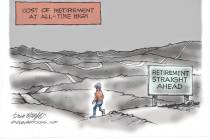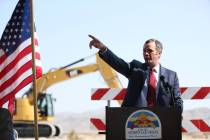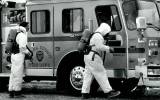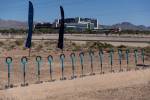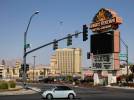Runaway train
Last year, UNLV's Institute for Security Studies completed a vulnerability analysis on various threats to the state. A number of natural and man-made disasters were assessed to help policymakers and emergency responders plan and prioritize training and funding requests.
The worst scenario the institute could come up with? Not a hijacked jetliner crashing into a Strip resort. And not a breach of a high-level nuclear waste shipment to the planned Yucca Mountain repository northwest of Las Vegas.
No, the biggest single threat to the population and economy of Southern Nevada is a chlorine gas accident. According to the report, if a railroad tanker carrying 34,500 gallons of chlorine crashed and spilled near the Union Pacific overpass at Charleston Boulevard in downtown Las Vegas, the toxic release could kill between 74,000 and 91,000 people under worst-case conditions.
Such a disaster would dwarf the American death toll of the Vietnam War.
So imagine the fear local authorities felt when they got word Wednesday morning that a tanker carrying chlorine gas had escaped the Arden train yard southwest of Las Vegas and was rolling toward the city, picking up speed.
Las Vegas police units sped to railroad crossings, and a department helicopter followed the tanker on its path through the valley.
The runaway tanker sped through the new neighborhoods around the southern Las Vegas Beltway, right past the Strip and over the Charleston bridge. After traveling about 20 miles at speeds up to 50 mph, the tanker finally slowed on an uphill grade, allowing Union Pacific maintenance workers to board it and pull the hand brake.
"Las Vegas dodged a bullet there," said Steve Calanog, chief of emergency response for the federal Environmental Protection Agency's Southwest region. "Had the train car released its contents in a residential area, the results could have been tragic."
Now come the urgent matters of finding out how the tanker got free and putting into place procedures to prevent such a high-risk situation from ever happening again.
In addition to Union Pacific's internal inquiry, the Federal Railroad Administration and the Public Utilities Commission of Nevada have launched investigations of the incident.
Union Pacific spokesman Mark Davis and other officials said Wednesday that it's too soon to say exactly how the tanker escaped the train yard, how much chlorine gas was in the tanker and whether Union Pacific could have done anything else besides let the car cruise all the way to North Las Vegas.
Whatever Union Pacific and these agencies learn, they must release their findings to the public. Las Vegas residents deserve to know what happened this week and whether anyone will be held accountable for the accident.
That said, it's worth noting here that rail shipments of chemicals such as chlorine gas are routine all across the country. For every accidental release of a hazardous material, tens of thousands of shipments are completed safely and without any notice from the population.
"Those kinds of things go through here from California up to Utah every day," Las Vegas Fire Department spokesman Tim Szymanski said.
Wednesday's incident also puts into proper perspective the doomsday shrieks of politicians and environmentalists opposed to the Yucca Mountain Project. Regardless of whether the high-level nuclear waste repository is good public policy, the threats presented by transporting high-level nuclear waste across rural Nevada pale in comparison to the level of risk associated with chemical deliveries made daily via road and railroad in urban Las Vegas.
Las Vegans can be thankful that no one was hurt by Wednesday's runaway tanker, and that so many private-sector and public-sector leaders are taking it so seriously.





